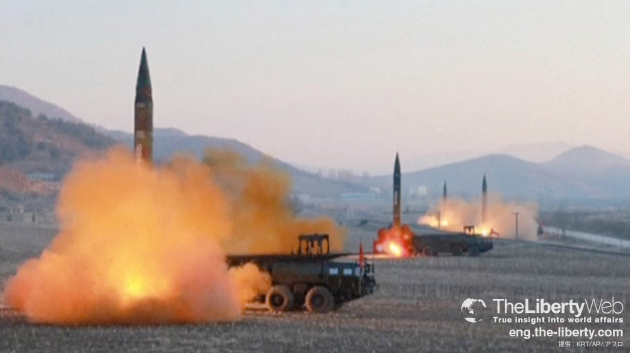North Korea Going Insane, South Korea in Disorder
How Should Japan React to the Impending North Korea Emergency?
The Korean Peninsula is unstable like never before.
In March, South Korean President Park Geun-hye was forced out of office for criminal activity. The next presidential elections are due to be held in May, but Moon Jae-in, who now has the highest support rate, is a strong pro-North Korea politician. He plans to “completely revise” the Japan-South Korea agreement, the General Security of Military Information Agreement, and the Park administration’s planned deployment of the Terminal High Altitude Area Defense (THAAD) system by the U.S. troops stationed in South Korea.
Mr. Moon proposed a federal union government policy to counter the anti-North Korea policy, and is thus trying to push South Korea to become just like North Korea.
There are no conservatives among the strong candidates for the elections, and there is a real possibility that the new administration will be pro-North, subordinate to China, and anti-Japan.
North Korea Upgrades their Missile Specs
Meanwhile, North Korea launched four ballistic missiles towards the Sea of Japan on the 6th of March. Three of them landed inside Japan’s Exclusive Economic Zone (EEZ) and the other missile landed closer to Japanese territory than any previous North Korean missile. North Korea announced that it was an “experiment targeting the U.S. military bases in Japan”. They also expressed their opposition to the U.S.-South Korea joint military training that was taking place around the same period.
After this missile incident it became clear that North Korea has a means of attacking U.S. military bases in Japan, and are not only able to launch multiple missiles simultaneously but can even make them land at the same time. If they attach a nuclear weapon or the deadly VX nerve agent to a missile, the devastation would be incalculable.
South Korea is facing the possible birth of a pro-North administration, and North Korea is upgrading their nuke and missile specs. How should Japan protect its national security and the stability of the region?
“Japan, Stand in Front and Fight”
During his visit to Japan in mid-March, U.S. Secretary of State Rex Tillerson declared that “the policy of strategic patience has ended”, and they would take new measures to de-nuke North Korea. He said that the Trump administration is “exploring a new range of . . . measures” including diplomatic and military.
But we cannot rest easy: the U.S. will be stuck if their mainland comes within range of North Korean ICBMs.
U.S. President Trump said that the “U.S. stands behind Japan one hundred percent” in his phone conversation with Japanese Prime Minister Shinzo Abe the day after North Korea’s missile experiment. Many Japanese citizens heaved a sigh of relief, but didn’t realize that Trump said he was “behind” Japan, implying that he wants Japan to stand in front and fight.
Independent Defense Power for Japan
Japan’s current missile defense system is a double layer: Aegis-class cruisers and MIM-104 Patriot missiles. But if multiple North Korean missiles are launched at Japan, shooting them all down before they reach Japan will not be easy. This means Japan needs a stronger force, like cruise missiles, so it is able to launch retaliation missiles.
“In defense against North Korea and China’s attacks, we need an underground city for a nuclear shelter, and a jamming system such as an electronic countermeasure (ECM) to fool the missiles”, said a former Japan Self-Defense Forces official.
“We need to quicken our developments of technology like railguns. We must become free of the shackles of the exclusively defensive national security policy and hold a level of offensive power. Otherwise we won’t be able to protect our borders or our people. The situation is that serious.”
Becoming nuclear armed within the limits of self-defense is a necessity for nuclear deterrence.
In his book “Japan’s Justice That Will Lead the World” Master Ryuho Okawa, founder of Happy Science, said:
“People can be killed in the millions unless we prepare nuclear arms for justified self-defense. If we don’t we could easily yield to their threats and become colonized without even putting up a fight . . . the greatest effect of nuclear weapons is that it is able to stop other nuclear possessing countries from using theirs.”
If Japan possesses power for justified retaliation, it will be advantageous in negotiations regarding the North Korean abductions of Japanese citizens. There is also a need to consider sending special armed forces when the Kim-administration is overthrown.
Japan should continue establishing cooperative relations with the U.S. and South Korea while strengthening its own independent self-defense. Japan has a responsibility to protect the security of East Asia.



















